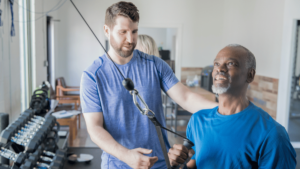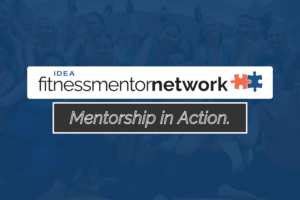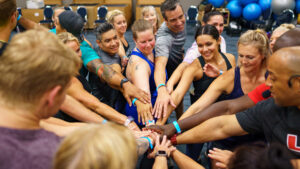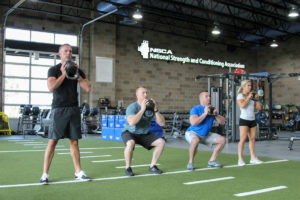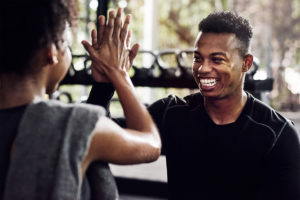Continuing Education/Home Study
IDEA Career Success Workshop: Staying in the Fitness Game
How do you succeed in the fitness profession? Whether you’ve just gotten certified, you’re returning to a fitness career or you’re an experienced pro who wants to develop new skills, the answer is the same: keep learning. Continuing education is a career necessity that becomes increasingly important as the fitness industry grows more sophisticated, diverse, specialized and evidence-based.
The Best Education Pathway for Success in the Fitness Industry
You may have decided on a career in fitness because you enjoy working out and helping people. While those are excellent starting points, professional success in the fitness industry requires…
IDEA Career Success Workshop: Learn to Grow
In any profession and in life; success is often measured by return on investment (ROI). For today’s fitness professionals, that ROI goes far beyond financial gain. It encompasses improved client…
Invest in Yourself: A Roadmap to Professional Growth for Fitness Pros
As fitness professionals, we’re experts at helping others invest in themselves. We create growth plans, set milestones, and celebrate our clients’ achievements. But do you have an intentional growth strategy…
Boosting Financial Success Through Advanced Education
As fitness and health professionals we all recognize the importance of staying on top of our game, passionately pursuing continuing education, and applying cutting edge strategies and evidence-based knowledge with…
Mentorship in Action: Introducing IDEA’s Fitness Mentor Network
The fitness industry is ever-evolving, presenting new challenges and opportunities for growth. Professionals in this field must stay ahead by continuously learning and adapting to changes in training techniques, coaching…
Celebrating a Year of Triumph and Looking Forward to New Horizons
As we close the chapter on another incredible year, I find myself both humbled and invigorated by what our community has achieved together. This year has been a testament to…
Is Formal Education Essential for Success as a Personal Trainer?
Does education matter for personal trainers? That singular, burning question has been ever-present throughout my 30+ years in the fitness industry. After deciding to return to college to pursue a…
November Knowledge: Earn CECs & Advance Your Expertise with IDEA
This month at IDEA Health & Fitness Association, we’re all about YOUR education! Are you in need of CEC credits to renew your certification? Would you like to learn more…
Focus on Education
There’s no debating the importance of continual learning and staying abreast on recent health and fitness research. Additionally, nationally accredited fitness certifications require continuing education in order to renew certifications….
High-Intensity Functional Training
Studies show that HIFT (high-intensity functional training) can boost exercise enjoyment and adherence.
Becoming a Holistic Wellness Industry
Success in fitness will require a more holistic wellness approach with knowledge of the emotional, social and mental perks of exercise.
Endless Summer
I’m longing for those carefree days and looking forward to some endless summer fun with family and friends after IDEA World Convention is wrapped up. Hiking, biking, rafting and horseback riding are all on my punch list for the trip. How did your childhood summers shape your fitness path? What are your memories and traditions of summer?
Transform Knowledge Into Power
Remember that spark of passion that led you to your fitness career? Like any fire, it needs tending and nurturing. If the idea of more education elicits painful memories of late-night cramming and pop quizzes, it may be time to reframe, reimagine and rekindle your yearn to learn.
Why Continuing Education Credits Matter
You hear a lot about continuing education credits in our industry. Do they matter to today’s fitness professional? How does a CEC/CEU impact the daily life of a fit pro?
Turn Your Passion Into a Thriving Fitness Career
The personal training industry is a rapidly growing field, which aims to serve the needs of a wide variety of the population. Fitness facilities can be a resource for individuals to expand their healthy behaviors and build a habit of fitness for a lifetime. Cultivating a culture of a healthy fitness lifestyle stems from having an NSCA-certified, well-educated personal trainer, who can ensure people are engaging in fitness behaviors and performing exercises safely and effectively. NSCA certifications equip professionals to educate, inform and inspire communities to lead active, healthy lifestyles.
Posture Correction for Static Damage
The word posture tends to evoke the image of a schoolgirl standing perfectly erect with a book on her head. More accurately, static posture refers to the way in which a person holds his or her body or assumes certain positions, such as sitting, standing or sleeping. The cumulative effect of the time spent in certain positions can lead to prolonged static-posture damage to both the musculoskeletal and myofascial systems of the body.
How to Develop Compassionate Coaching
Compassionate coaching involves recognizing the needs of another person, feeling empathy for that individual and taking action to help.
Create a Sustainable Career to Last a Lifetime
Honing your skillset through continuing education opportunities will allow you to better provide clients with safe and innovative training opportunities. When equipped with a toolbox full of experience and education, you are better prepared to create a sustainable career.
Lower Weight in Young Women ≠ Higher Fitness
A common assumption is that people who weigh less are more fit. For younger adult women, however, this may not be the case.
